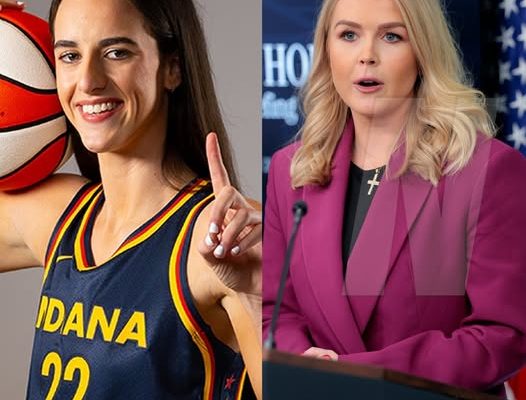🎥Karoline Leavitt & Caitlin Clark ORDERED to REMOVE the US FLAG – Their Response SHOCKED the Nation!

Karoline Leavitt & Caitlin Clark ORDERED to REMOVE the US FLAG – Their Response SHOCKED the Nation!
What began as a routine night of honor and celebration at the American Honor Gala turned into a moment that rocked the nation. In the Grand Ballroom of the Washington Liberty Hotel, the annual event—meant to celebrate veterans, first responders, and patriotic leadership—quickly shifted into a national flashpoint after two high-profile honorees, Karoline Leavitt and Caitlin Clark, were indirectly challenged over their display of patriotic symbols. The response they gave, however, would soon resonate across the country in ways no one could have predicted.
Two Women, One Moment
Karoline Leavitt, a rising conservative political figure known for her unapologetic stance on American values, and Caitlin Clark, one of the most celebrated athletes of her generation, were both in attendance to be honored for their contributions to American society.
Leavitt carried a folded American flag—one presented to her family after her grandfather, a WWII veteran, passed away. Clark wore a warm-up jacket embroidered with the phrase “Honor the Fallen”, a tribute to military heroes and their families.
What happened next seemed orchestrated—but not by them.
A Loaded Challenge
As the national anthem concluded, a well-known journalist at the VIP table rose and confronted them both, loudly asking:
“Don’t you think it’s time we move forward from outdated ideas of patriotism?”
Tension gripped the room. Cameras rolled. Reporters leaned forward. It was a provocation disguised as a question—and everyone knew it.
Leavitt was the first to respond, standing with her flag in hand. “This flag,” she said calmly, “is not outdated. It’s a reminder of sacrifice and duty—the price paid so that we could all be here tonight freely speaking our minds.”
Clark didn’t hesitate either. “If honoring those who gave us the freedom to play, speak, and live is controversial, then we need to ask why.” Her voice was clear. “We can honor the past and still work toward a better future. Those aren’t opposites—they’re connected.”
The Room Divides—Then Erupts
Initially, silence followed. But then a decorated veteran rose and broke it. “When I see young people like them standing up for what they believe in,” he said, “I don’t see division. I see hope.”
The applause grew—slow at first, then rising until nearly half the room stood in support. Others, including some media and political figures, remained seated, disapproving or calculating.
But the message was out.
Media Firestorm
Within minutes, social media platforms lit up with video clips of the exchange. Outlets across the spectrum spun it their way. One network accused the pair of turning a unifying event into a political battleground. Another hailed them as courageous voices for a forgotten America.
Clark’s sponsors were rattled. Some paused deals. Others went silent. Leavitt faced pressure from party insiders urging her to backpedal or soften her stance.
Neither did.
Three days later, the two met privately. “They thought the pressure would make us fold,” Leavitt told Clark. She smiled. “They were wrong.”
The Backlash—and the Turn
As the media frenzied, a surprising voice broke through: a retired four-star general went live on national television and said what many Americans were thinking.
“If honoring the flag and our fallen is controversial,” he said, “then the problem isn’t with them. It’s with us.”
That moment flipped the narrative.
News outlets recalibrated. Sponsors who had distanced themselves began reaching out again. Politicians who had stayed silent or criticized the women now dodged the topic. Support poured in from veterans groups, athletes, and everyday Americans alike.
Not Just a Moment—A Movement
What was meant to shame and silence instead sparked a larger conversation. For many, Leavitt and Clark became symbols not of division—but of courage. They hadn’t planned to become flashpoints in a cultural debate, but when forced into the spotlight, they chose principle over popularity.
And America noticed.
Whether you agreed with them or not, one thing was certain: the image of these two young women standing their ground—with flag and conviction in hand—will not be easily forgotten.

